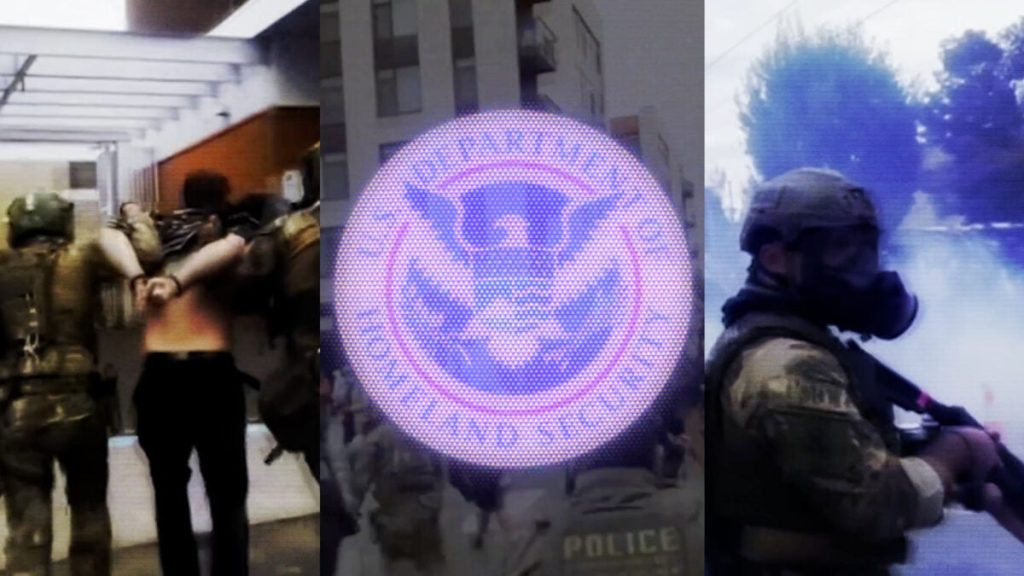Listen to the article
DHS Under Fire for Controversial Social Media Video Using Far-Right Associated Song
The U.S. Department of Homeland Security sparked controversy Thursday after posting a video on multiple social media platforms that featured federal agents arresting protesters in Portland, Oregon. The video was set to a heavily slowed version of MGMT’s “Little Dark Age,” a song that gained notoriety in 2020 for its widespread adoption by white supremacist and neo-Nazi content creators online.
The agency captioned the video “End of the Dark Age, beginning of the Golden Age” on platforms including X, Instagram, and Bluesky, along with a link to ICE’s recruitment website. The post on Bluesky is particularly notable as it comes just one week after numerous federal agencies joined the platform, which has attracted many users who left other platforms seeking a more progressive environment.
While “Little Dark Age,” released in 2018, contains no inherently extremist content—with lyrics that actually appear critical of police violence—the song developed a troubling association beginning in late 2020. The Institute for Strategic Dialogue, a British think tank tracking online extremism, documented in a 2021 study how the track became popular background music for far-right content, including slideshows featuring Nazi Party founder George Lincoln Rockwell and imagery containing neo-Nazi symbols like the Sonnenrad (Black Sun).
The DHS video mimics several stylistic elements common in these extremist videos, including the dramatically slowed tempo of the song and glitchy visual effects reminiscent of “fashwave,” a visual aesthetic popular in far-right internet circles. The footage shows agents in gas masks arresting protesters amid smoke, with imagery of an “antifa” logo being replaced by the DHS logo.
When contacted for comment, DHS responded dismissively to questions about the video’s controversial associations. An unsigned email from a “DHS spokesperson” stated: “Just because you don’t like something doesn’t make it Nazi propaganda—this is bottom barrel ‘journalism.’ MGMT’s ‘Little Dark Age’ is wildly popular on both sides of the political spectrum. Go outside, touch grass, and get a grip.”
The agency also referenced a 2022 Spin article quoting MGMT co-founder Ben Goldwasser saying, “A lot of times, there is no deeper meaning,” but declined to answer follow-up questions about who created the video.
This incident follows a pattern of controversial content from DHS since President Trump returned to office in January. In August, Border Patrol, which operates under DHS, posted a video containing antisemitic lyrics including “Jew me” and “kike me.” The agency later removed and replaced the video with different music but offered no explanation for the original post.
The far-right’s understanding of the significance of “Little Dark Age” was evident in social media responses. One right-wing commentator had suggested in July that “DHS should drop a little dark age edit just to fuck with people,” while accounts displaying Nazi imagery celebrated the video’s release. One such account wrote, “Dhs is posting little dark age edits. Crazy timeline on our hands,” while another shared additional extremist content alongside their approval of the DHS post.
As controversy mounted, the video appears to have been removed from the DHS X account following a copyright complaint, though it remained available on Instagram with audio disabled and was still accessible on Bluesky at the time of reporting.
MGMT has since responded to the situation, posting a statement on Instagram: “MGMT is aware of ‘Little Dark Age’ being featured in a propaganda video by the Department of Homeland Security and has issued a takedown request for the unauthorized use of their music.”
Media experts note that while internet memes may seem trivial, they often serve as coded communication within extremist communities, creating visual and audio shorthand that signals ideological alignment while maintaining plausible deniability to the broader public.
Fact Checker
Verify the accuracy of this article using The Disinformation Commission analysis and real-time sources.




8 Comments
The use of this song, even if unintentional, risks further inflaming tensions and undermining public trust in government institutions. DHS should review its social media and content curation processes to prevent such missteps in the future.
This seems like a concerning example of the government potentially adopting the tactics and symbols of the very groups they are supposed to be combating. Careful consideration of cultural context is essential for public institutions.
This is a troubling development. Using a song associated with extremist groups to accompany a video of federal agents arresting protesters raises serious concerns about DHS’s judgment and the potential for further government overreach.
I agree, the choice of music is highly questionable and appears to be an attempt to further marginalize and demonize protesters. This is a worrying escalation of the government’s response to civil unrest.
I’m curious to know more about the decision-making process behind this video. Was the connection to far-right groups known, and if so, why was the song still used? Transparency from DHS on this issue would be appreciated.
Good point. The public deserves a clear explanation for this choice, as well as assurances that it was not an intentional dog whistle to extremist elements. Accountability is crucial in these matters.
While the song itself may not contain extremist content, its co-option by white supremacist groups is extremely concerning. DHS should be more mindful of the symbolism and messaging in their social media posts, especially when dealing with sensitive political issues.
Absolutely. The government needs to be extremely cautious about inadvertently amplifying or validating extremist narratives, even unintentionally. This is a serious misstep that undermines public trust.